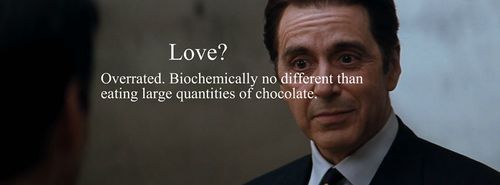Maelstrom
Magical Pattern Auspie
I find the notion of love- that initial First Few Months Love- to be a very interesting one- even knowing what it comprises, what it does to us physically, that it makes us stupid [really], that it's kind of a way to reel us in and hook us... I find everything about it fascinating.
There have been so many things written about it from everywhich angle.
Including studies done about how people attain this state of being in love, and experiments which hope to acheive that state "artificially". [But then... if you actually then feel you are in love, truly, at the end of such events- what is artificial about it? And then years later? hmm]
Ha, sorry...
I'm getting confused, back on track- I think there's a lot to be said for what we expect to have to put into a relationship. If we expect a "perfect" relationship to mean no work, any relationship will be at the very least imperfect, but more often disappointing and sometimes closer to a disaster. Two people coming together who might not initially seem an obvious match but who see a relationship as an endeavor necessitating teamwork may have a great lasting bond.
"Give 60%, Expect 40% [think variably]"<--- This helps, in my experience.
...did I tangent? I don't think so, but this is a really confusing conversation in some ways for me. I try not to tangent too much but I can't always tell when I'm overdoing it.
Hi SignOfLazarus , my sentiments exactly....I love the first fiery romance thing...but I also want the warm comfortable fuzzy slippers thing later too...ware you both learn to come together and just be sort of comfortable with eachother.
I haven't had much luck tho, no matter how accommodating I try to be, it seems like some people move the pleasing me bar just a little higher, every time you get close to pleasing them. I think it's some sort of dirty trick to squeeze more out of you.
People who refuse to be pleased deserve to be lonely in my opinion.

